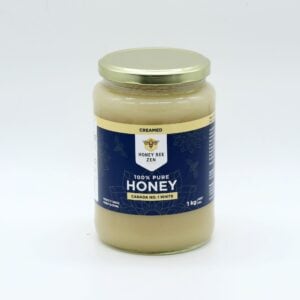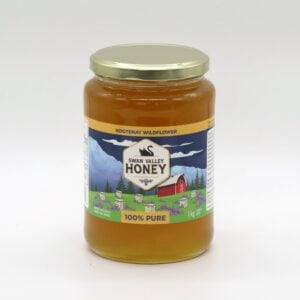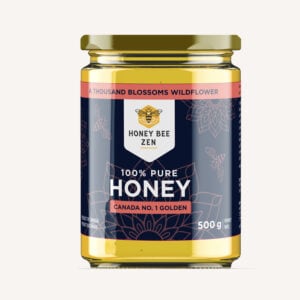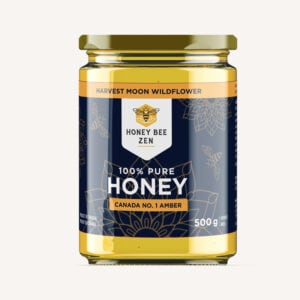Description
We collect this award-winning and delectable Fireweed Honey – known to beekeepers as “the Champagne of Honeys” – from the mountains around our beautiful Creston Valley. On one side of us is the Purcell Mountains, and on the other, the Selkirks. Both ranges abound with this native purple plant, which grows in areas disturbed by fire or logging. When found In large quantities it allows our bees to collect enough nectar to produce an unique, very light, mild, buttery honey. It is so clear that it classifies as “extra water white” in colour, a class highly-regarded by honey enthisiasts.

Fireweed stalk and flowers
In 2024 this honey won First Place in Extra Water White at the American Honey Show, the first time a Canadian honey was given this honor.
Our signature Kootenay Wildflower Honey comes from alfalfa, clover, snowberry and other plants. But our Fireweed Honey is virtually a monofloral honey. Given where it grows, Fireweed is by default just about the only food available for our honey bees. Sometimes there will be incidental Goldenrod or Creeping Thistle, but these plants are sparse in comparison to the vast acreages of Fireweed.
In mid-July we truck our hives high up into the mountains and place them where little else grows except our prized Fireweed. This is also bear country, where both the Grizzly and Black Bears roam. So we have to build electrified yards to protect our bees and their crop from Mr. and Mrs. Bruin.
This honey is notoriously difficult to collect. The weather has to be just right, not too hot and not to cool. The fireweed patch also has to be young. As the area gets older succession trees such as alder and replanted conifers start to take over and claim water resources for their own growth. The season is also short; a typical collection period lasts only a month or six weeks.
We don’t get Fireweed Honey every year, so be sure to buy it when we have it available!
How Do You Know This Is Pure Honey?
We rigorously protect the purity of our honey; we regularly send samples in for floral fingerprinting by Canadian honey authentication programs. These programs can identify specific forages and pollens. This process also identifies honeys that have been adulterated with other sugars. We are proud to say our honeys pass with flying colours.
Our pathway to succes as beekeepers is to always remember it is our bees who are our most important employees. In other words, taking care of our bees comes first. That’s the Honey Bee Zen way.

A high-density Fireweed patch in the Selkirk Mountains

One of our Fireweed bee yards in the Selkirk Mountains













Reviews
There are no reviews yet.